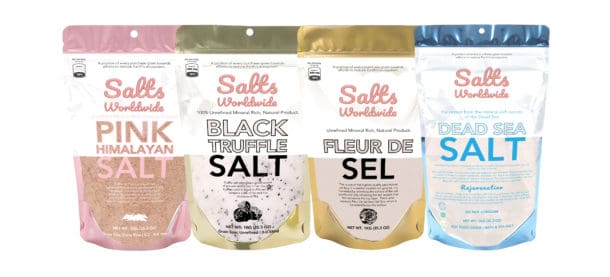The benefits of bath salts can be varied. Epsom salt relieves stress, Dead Sea salts soothe rheumatic conditions, and Himalayan salt is known to ease aching joints. They are also used to promote seed germination. This article focuses on these various types of salts.
Epsom salt relieves stress
Bathing with epsom salt can help reduce stress in a variety of ways. For one, the salt helps stabilize your mood by increasing serotonin levels, a chemical that regulates your mood. This chemical is responsible for feelings of well-being and happiness. Another way to use epsom salt is as a scrub in your shower.
In addition to its use as a bath salt, Epsom salt can also be used in other ways, such as making homemade beauty products. It can be used to add volume to your hair, exfoliate your skin, and help you relieve constipation. Additionally, it helps remove toxins from your body. It can also be used as a natural insecticide, which makes it great for gardeners.
It can also help relieve stress by increasing magnesium levels in the body. This mineral is also known for its relaxing properties, and is an excellent supplement for people who are deficient in it. In addition to relieving stress, Epsom salt can also improve sleep and relieve a variety of skin conditions.
Himalayan bath salts ease aching joints
Regular baths with Himalayan bath salts ease aching muscles and joints, and are also excellent for relieving inflammation. They contain 84 unique minerals, including magnesium, potassium, bromide, and calcium, which nourish and repair the body. Bromides are particularly beneficial for easing muscle pain and stiffness. Moreover, they relieve stress and induce sleep. This is one reason why ancient patients often took salt baths to treat chronic conditions.
The healing power of Himalayan bath salts is widely acknowledged. These salts are anti-bacterial, anti-viral, and an electrolyte. They also promote the functioning of nerves and aid in the circulation of blood. While you can use any salt in your bath, Himalayan bath salts are known to ease sore muscles and relieve inflammation. Other common salts include Epsom salt, sea salt, and pink Himalayan salt. They contain minerals such as magnesium, calcium, potassium, and phosphorus. Some of them also contain essential oils, which enhance the healing effects.
Bath salts from the Himalayan Mountains are rich in magnesium and sulfate. They are naturally pink and contain 84 valuable trace minerals. You can buy Himalayan bath salts in various sizes and colors. However, the color of the salts does not affect the water’s taste or smell. It is also safe to use Himalayan bath salts during pregnancy.
Dead Sea salts soothe rheumatic diseases
Dead Sea salts are rich in magnesium, potassium, calcium, and iodide, which work together to detoxify blood and stimulate circulation. These minerals are particularly beneficial for those with rheumatic diseases, including rheumatoid arthritis. Furthermore, they may relieve other symptoms such as muscle cramps, sleep disturbances, and mood swings. They also improve joint flexibility, reduce pain, and reduce swelling.
Research has shown that regular Dead Sea bathing may relieve some of the symptoms of rheumatic diseases. It has been shown to reduce inflammation and improve the hydration of the skin. Studies have even shown that regular Dead Sea baths can be beneficial for arthritis sufferers.
People with rheumatic diseases can also benefit from the anti-inflammatory properties of the Dead Sea salt. It also helps relieve muscle aches and pain, and relaxes the mind, allowing the patient to focus on healing. It has been shown to help people with dry skin, as it helps retain moisture and fight against aging.
Another benefit of Dead Sea salts is the ability to relieve symptoms of psoriasis. People suffering from the condition suffer from itchy patches on their skin, which can affect the skin and eyes. Dead Sea bath salts help relieve this condition, as their high mineral content promotes skin absorption and permeability.
Epsom salts promote seed germination
Epsom salts are beneficial to plants because they strengthen cell walls, which is essential for seed germination. Using one to two teaspoons per hole for seedlings or a cup per 100 square feet of soil can jumpstart germination and boost plant health. However, use with caution as the salt can damage the roots.
In addition to being an excellent soil additive, Epsom salts also provide important micronutrients that plants need for germination. The salts contain magnesium and sulfur, which are crucial for germination and plant growth. They can be sprinkled on seed beds or added to seed holes after seeds are planted.
Plants require a certain amount of magnesium in order to produce chlorophyll, or green leafy substances. Epsom salts can help to boost the magnesium level in soil, but they should not be used as a main supplement. They will not increase plant photosynthetic capacity. Adding epsom salts to your soil can improve seed germination, but it is not a substitute for balanced fertilizers.
If you are concerned about the health risks of using Epsom salt in your garden, there are safer alternatives. However, this practice is not recommended, because there aren’t any studies confirming its safety for your plants. In fact, it can be dangerous to your health, causing serious side effects. Fortunately, there are many alternatives available.
Himalayan bath salts reduce inflammatory diseases
Bath salts have long been recognized as beneficial for the body. They relieve pain, promote healing, and improve cellular function. These natural salts are also beneficial to the skin, soothing sore muscles and joints. Many people enjoy soaking in a warm salt water bath for its many health benefits.
Himalayan salts are a great source of minerals, including calcium, magnesium, iron, and potassium. They are considered the purest salt on the planet and are packed with beneficial properties. The minerals in Himalayan salts help reduce inflammation by neutralizing toxins. They also have antimicrobial properties.
The antimicrobial properties of Himalayan salts are effective in treating skin conditions, including acne and psoriasis. The salts also help to reduce the pain and redness of insect bites, skin irritation, and eczema. These salts help the body maintain fluid balance and improve circulation.
Another benefit of Himalayan bath salts is that they are great for relaxing the muscles and skin. They also relieve stress. People who suffer from inflammatory diseases may benefit from regular baths. These salts are naturally pink and contain high levels of magnesium, iron, and calcium.
Fleur de Sel soothes aching joints
Fleur de Sel is a natural sea salt that is packed with 84 essential minerals. Its therapeutic properties are a boon to people with aching joints and muscles. It is also a natural skin cleanser. The salt’s mild flavor and crystal-like texture make it an excellent choice for a soothing bath. It also helps stimulate the immune system. It has many uses, but it is especially good for aching joints.
Fleur de Sel comes from the sea and is harvested by hand in Brittany, France. It is prized for its paper-thin crystals and is expensive. Because Fleur de Sel is a natural sea salt, it contains less sodium chloride than regular salt and more trace elements. The best Fleur de Sel is harvested in Guerande, a town in Brittany, France.
Sea salt contains many beneficial minerals and is a great source of magnesium. It helps soothe aching joints, lowers blood pressure, and soothes eczema and arthritis. In addition to being an excellent pain reliever, sea salt also helps maintain the pH balance of the body.
Epsom salts reduce inflammatory diseases
Epsom salt is a common home remedy for many ailments. Its benefits are mostly attributed to magnesium, a mineral that many people lack. It has many practical uses and can be a valuable part of a healthy lifestyle. In this article, we’ll take a closer look at this mineral and how it can benefit your health.
Epsom salt helps regulate the electrolytes in the body and allows nerves, muscles, and enzymes to function properly. The magnesium in Epsom salt plays a key role in the proper use of calcium, the main conductor of electrical impulses in the body. It can also provide pain and swelling relief for arthritis sufferers. Bathing in Epsom salt water may also improve heart health by promoting blood circulation and reducing the risk of blood clots. This is also good news for people who suffer from sudden heart attacks.
The most common justification for using Epsom salts is their purported antibacterial, anti-inflammatory, and detoxifying effects. However, there’s no real scientific evidence to support these claims. Instead, many people who use Epsom salts just want to sell you on the benefits of magnesium sulfate.



